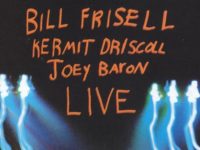by Tom Johnson
Bill Frisell has become one of the most easily recognizable guitarists in jazz, and it’s not without an effort to incorporate himself into as many styles as one person could in a lifetime. Few guitarists in any genre could pull off the feat of having played in nearly every style imaginable — metal, ambient, acoustic, country, bluegrass, and even traditional jazz guitar — but to do so and retain the characteristics that make your sound uniquely and utterly unmistakeable is unparalleled.
On nearly every release, Frisell has been accompanied by his usual assortment of looping and sound-treatment devices, items that most traditional jazz guitarists eschew in favor of the bare tones of their instrument’s wood, strings and in the case of electrics, pickups. Frisell long ago set himself apart from the herd by his use of — but not dependence upon — outboard effects that mutate and mold his sound. And yet, somehow, his sound is honest and earnest, as warm as any un-encumbered guitarist, yet it can often be more enigmatic and intriguing.
It’s not the effects, it’s not even the instrument. It’s the fingers driving the music out of the wood and steel and circuit boards that makes him so unique. It’s the phrasing and choices of chords, the laid-back demeanor. It’s what many copy but so few capture that makes Bill Frisell so unique.
[ONE TRACK MIND: Bill Frisell discusses his John Lennon tribute recording ‘All We Are Saying,’ as well as key moments from ‘Nashville’ and ‘Bill Frisell, Ron Carter and Paul Motian,’ among others.]
What really makes him so unique is a sense of adventure. When many musicians are happy to have their own niche and style, Frisell sets out to conquer something new. Whether it’s skronky death-surf-spaghetti-western jazz via John Zorn’s Naked City or an album of unabashedly country tunes such as Nashville, Frisell takes it all on with the glee of a child. And that’s what makes it all work so well: You can hear the fun Frisell is having, you can hear the smile on his face as he plays. That’s not to say he takes on his endeavors as if they are silly larks — each new turn is a serious venture, and each result is worthy of serious contemplation.
When an artist makes a sudden shift of style, it is often cause for worry: Is the artist simply following trends, looking to score another hit with something in the current vernacular that’s selling big this week? Frisell’s evolution has followed a logical path however, but has still taken turns that in any other artist would spell disaster. After finding a following for the spacey desolation of his early work, Frisell began incorporating tinges of country and bluegrass, or, really, accentuating the tinges that had been hiding behind the squawls and squeals. Nashville brought the sound to the fore and proved to be the inspiration for nearly everything he released in its wake. While not as heavily centered on country music, Frisell’s recent work had clearly changed. However, instead of alienating fans Frisell has managed to pull them that much closer.
Listening to a musician follow his desires, if you can put aside your demands as a fan, is rewarding for both parties involved. A listener to The Intercontinentals is advised to wisely put aside any hopes of hearing Frisell break out with a moaning, sighing solo at any point in the album, as he would do on earlier albums. What the listener will get, however, is another rewarding slice of Americana, tinted this time by a very slight Latin slant in places with the addition of some percussion elements and vocals of Vinicius Cantuaria, in others by more ethnic instruments such as the oud and bouzouki of Christos Govetas and calabash, djembe, and congas of Sidiki Camara. This is not to say that the album is significantly Latin or Indian in nature — they are simply touches here and there. Frisell’s fascination with the down-south backwoods is still loud and clear, and is accentuated by Greg Liesz’s soulful slide and pedal-steel guitars and the violin of Jenny Scheinman.
In many ways, The Intercontinentals serves as a worthy counterpart to Blues Dream, following a similar slow-burn approach that will continue to reward the listener the more familiar it becomes. Both albums draw the same first impression — that there is much here to comprehend and it may take some warming up to. Several years later, Blues Dream, after having initially elicited a cold response, has become a clear gem among Frisell’s stunning releases. The Intercontinentals has followed a similar path.
[amazon_enhanced asin=”B000088SX8″ price=”All” background_color=”FFFFFF” link_color=”000000″ text_color=”0000FF” /] [amazon_enhanced asin=”B004RCTZ9O” price=”All” background_color=”FFFFFF” link_color=”000000″ text_color=”0000FF” /] [amazon_enhanced asin=”B003EH0BQ4″ price=”All” background_color=”FFFFFF” link_color=”000000″ text_color=”0000FF” /] [amazon_enhanced asin=”B001EOOCRI” price=”All” background_color=”FFFFFF” link_color=”000000″ text_color=”0000FF” /] [amazon_enhanced asin=”B00000IXTW” price=”All” background_color=”FFFFFF” link_color=”000000″ text_color=”0000FF” /]





I played The Intercontinentals a lot as a dj when the album was released… The album on a whole has a good feeling about it.